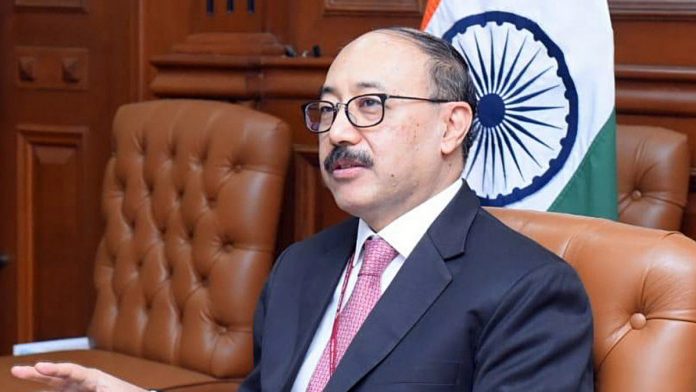GANGTOK: India’s Foreign Secretary Harsh Vardhan Shringla has said a strong, stable and prosperous North East is key to building a Self-Reliant India.
“The Act East Policy of the Prime Minister provides an effective means to achieve it,” he said at a webinar on “Self-Reliant India: Reimagining the North East India in terms of Employment and Skill”.
The realisation of this dream, he continued, brings together various Ministries of the Government of India, as also the state governments, which are both implementing agencies and beneficiaries at the ground level.
He said that the Government of India was focussing on timely completion of infrastructure projects, such as roads, railway lines, port upgradation, border check posts and trading points, both in the North East and across the border, in countries in the neighbourhood.
“The Ministry of External Affairs will continue to support and facilitate all initiatives in this regard,” he added.
On the occasion, he also lauded the contribution of five out of the 11 institutions established by Institute of Chartered Financial Analysts of India (ICFAI) University, Sikkim (ICFAI) located in states of India’s North East.
The power of Himalayan rivers has been used for the joint benefit of the North East and its neighbours through hydro electric projects in Bhutan.
“These institutions are greatly contributing to the education and skilling of the people of the region,” he said at the webinar.
Stating that he has a special attachment to Sikkim, Foreign Secretary Shringla said though geographically small, Sikkim is home to a wide variety of immensely beautiful landscapes.
“Sikkim is also a model state for the rest of India in the areas of organic farming, sanitation and other socio-economic indicators,” he added.
According to him, India’s North-Eastern states are known for their natural beauty, and a storehouse of Indian talent.
The ICFAI, which began as a modest not-for-profit society in 1984, has gone on to chart an exemplary course in the field of higher education over the last three decades, he claimed.
He further stated that the Aatmanirbhar Bharat Abhiyan announced by the Prime Minister assumes great significance, especially for the states of the North East.
“The Mission for building a self-reliant India and the stimulus package of Rs 20 lakh crores launched under the initiative aims to both reinvigorate the economy and provide a social safety net to our vulnerable sections,” he added.
Stating that the positive cascading effects of improved connectivity bring trade and investment, he said that they also bring employment opportunities in the region.
“The traditional strengths of the North East in the services sector will encourage investment in Business Process Outsourcing, eco-tourism, wellness and hospitality and various other areas,” he stated adding that the expanded connectivity will enhance tourist footfalls and give a boost to the hospitality industry.
Maintaining that better connectivity will also reduce the cost of transport, he added that the transport premium borne by the people of the North East until now, for even basic commodities, will steadily fall.
“This will fuel further infrastructure development in the region and will create a virtuous cycle of prosperity,” he said.
According to him, the potential of mutually beneficially resources and of generating common economic spaces is evident in another area – energy.
“Bangladesh currently imports 1160 MW of power through adjoining states in India,” he said adding that hydrocarbons will flow through an India-Bangladesh Friendship Pipeline.
The power of Himalayan rivers has been used for the joint benefit of the North East and its neighbours through hydro electric projects in Bhutan.
“We are also looking at exporting the surplus hydropower potential of the North East to Bangladesh and Myanmar,” he added.








Comment